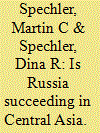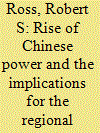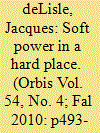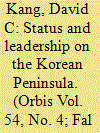|
|
|
Sort Order |
|
|
|
Items / Page
|
|
|
|
|
|
|
| Srl | Item |
| 1 |
ID:
101780


|
|
|
|
|
| Publication |
2010.
|
| Summary/Abstract |
Over the past fifteen years, a quiet strategic shift has occurred in Japan. During the cold war era, Japan's defense was oriented towards the Soviet threat north of Hokkaido. However, under the very real threat of North Korean aggression, the less tangible threat of terrorism, and the perceived need to participate more fully in international peacekeeping activities, Japan has changed the characteristics of its armed forces. Additionally, an increasingly self-confident China is testing Japan's resolve in the waters surrounding Japan, simultaneously speaking of cooperative development while laying claim to a swathe of Japanese territory and waters. An apparently ambivalent United States, in relative decline, watches these proceedings. Japan has reoriented its defense posture to face south, towards the East China Sea, trying to shape Chinese behavior and hedge against future Chinese adventurism. However, with a tangible recommitment of American attention to East Asia and a firm, public, American stand on behalf of Japan's territorial integrity, future conflict can be deterred.
|
|
|
|
|
|
|
|
|
|
|
|
|
|
|
|
| 2 |
ID:
101783


|
|
|
| 3 |
ID:
101781


|
|
|
|
|
| Publication |
2010.
|
| Summary/Abstract |
On a number of recent occasions, the top Russian leadership has expressed its special interest in the affairs of former Soviet republics, including the assertion that Russia has a "privileged" relationship with these now independent states.1 Is this a claim of accomplished fact, of future intention, or perhaps an empty expression of nostalgia for lost status? As we see it, the record of Russian actions in the largest group of these states-the five of Central Asia-allows us to exclude the first and question whether the second is realizable. Russia must contend with the aspirations of those states themselves, as well as the determined interests of China and, to a lesser extent, the West.
|
|
|
|
|
|
|
|
|
|
|
|
|
|
|
|
| 4 |
ID:
101778


|
|
|
| 5 |
ID:
101782


|
|
|
| 6 |
ID:
101776


|
|
|
|
|
| Publication |
2010.
|
| Summary/Abstract |
This article examines the reach of China's growing economic and military power in East Asia. It examines the economic and military sources of the rise of China and the implications of the development of Chinese strategic influence on the Korean Peninsula and across the Taiwan Strait. It also considers where in East Asia China has yet to develop greater coercive or deterrent military capabilities, so that the strategic status quo in this area persists, thus establishing the regional strategic boundaries of the rise of China and the emerging U.S.-China great power order in East Asia.
|
|
|
|
|
|
|
|
|
|
|
|
|
|
|
|
| 7 |
ID:
101775


|
|
|
|
|
| Publication |
2010.
|
| Summary/Abstract |
Soft power, like so much else in relations between the People's Republic of China and Taiwan, is asymmetrical and freighted with implications for U.S. policy and U.S.-China relations. For China, soft power largely serves-or strives-to reduce alarm (or at least reaction) among other states concerned about China's new-found hard power or, perhaps more realistically, the hard power that China's economic rise can underwrite. Much of the value for Beijing of soft power is-and is likely to remain for quite some time-its potential contribution to reducing the likelihood that other states will react to China's rising hard power in ways that could threaten China's interests.
|
|
|
|
|
|
|
|
|
|
|
|
|
|
|
|
| 8 |
ID:
101777


|
|
|
|
|
| Publication |
2010.
|
| Summary/Abstract |
This article examines both South and North Korea's search for status in international relations. By exploring how these countries seek status for themselves, how states define status for themselves and others, and also what status they are willing to grant other regional states, this paper concludes that crafting a stable regional status hierarchy will be as important to future stability on the Korean peninsula as will be the crafting of a stable balance of power or deepening economic interdependence.
|
|
|
|
|
|
|
|
|
|
|
|
|
|
|
|
| 9 |
ID:
101779


|
|
|
|
|
| Publication |
2010.
|
| Summary/Abstract |
Mongolia is not a hapless object on which the great powers may act at will. Like other small states existing on the periphery of great powers, Mongolia has-and does exercise-political agency. Its policies and actions affect not only the bilateral relationship it has with each of the greater powers, but-as an outgrowth of those bilateral relations-it also exerts some influence on the relationship that the great powers, in turn, have with each other. "… you know as well as we do that right, as the world goes, is only in question between equals in power, while the strong do what they can and the weak suffer what they must."1
|
|
|
|
|
|
|
|
|
|
|
|
|
|
|
|
|
|
|
|
|